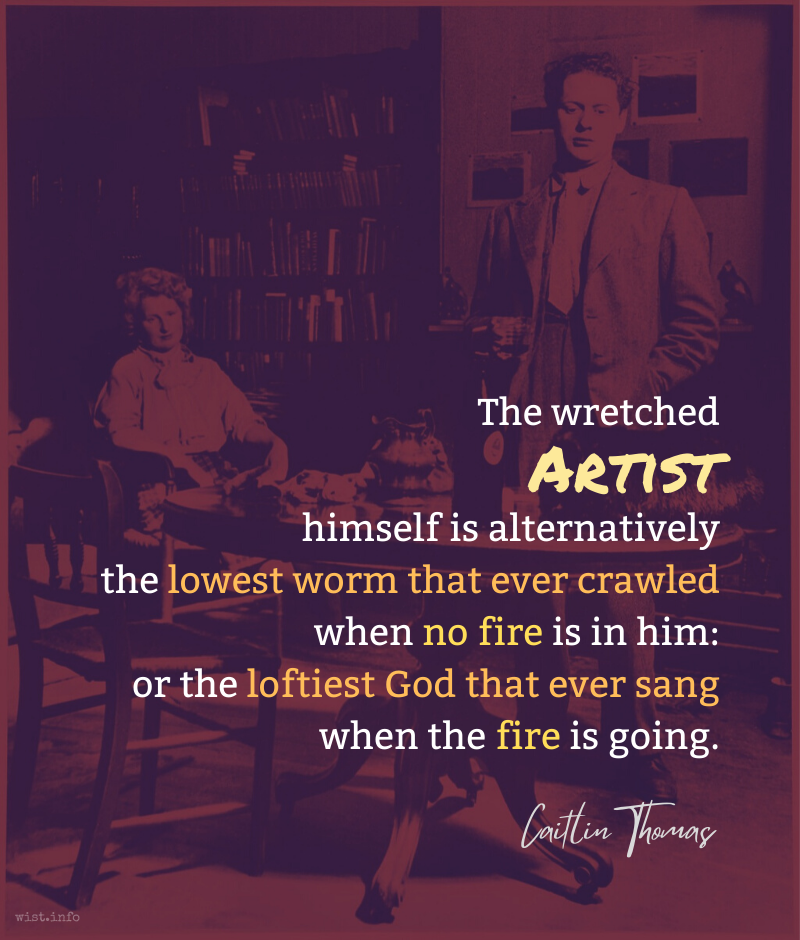An old racetrack joke reminds you that your program contains all the winners’ names. I stare at my typewriter keys with the same thought.
Mignon McLaughlin (1913-1983) American journalist and author
The Neurotic’s Notebook, ch. 5 (1963)
(Source)
Quotations about:
writer’s block
Note not all quotations have been tagged, so Search may find additional quotes on this topic.
You see we make our writers into something very strange. […] We destroy them in many ways. First, economically. They make money. It is only by hazard that a writer makes money although good books always make money eventually. Then our writers when they have made some money increase their style of living and are caught. They have to write to keep up their establishment, their wives, and so on, and they write slop. It is slop not on purpose but because it is hurried. Because they are ambitious. Then, once they have betrayed themselves, they justify it and you get more slop. Or else they read the critics. If they believe the critics when they say they are great then they must believe them when they say they are rotten and they lose confidence. At present we have two good writers who cannot write because they have lost confidence through reading the critics. If they wrote, sometimes it would be good and sometimes not so good and sometimes it would be quite bad, but the good would get out. But they have read the critics, and they must write masterpieces. The masterpieces the critics said they wrote. They weren’t masterpieces, of course. They were just quite good books. So now they cannot write at all. The critics have made them impotent.
Ernest Hemingway (1899-1961) American writer
Green Hills of Africa, ch. 1 (1935)
(Source)
Speaking of American writers.
The wretched Artist himself is alternatively the lowest worm that ever crawled when no fire is in him: or the loftiest God that ever sang when the fire is going.
Caitlin Thomas (1913-1994) British author, wife of Dylan Thomas [née Macnamara]
Not Quite Posthumous Letter to My Daughter (1963)
(Source)
I’m convinced if I keep going one day I will write something decent. On very bad days I will observe that I must have written good things in the past, which means that I’ve lost it. But normally I just assume that I don’t have it. The gulf between the thing I set out to make in my head and the sad, lumpy thing that emerges into reality is huge and distant and I just wish that I could get them closer.
Neil Gaiman (b. 1960) British author, screenwriter, fabulist
“This Much I Know,” The Guardian (2017-08-05)
(Source)
Don’t panic. Midway through writing a novel, I have regularly experienced moments of bowel-curdling terror, as I contemplate the drivel on the screen before me and see beyond it, in quick succession, the derisive reviews, the friends’ embarrassment, the failing career, the dwindling income, the repossessed house, the divorce … Working doggedly on through crises like these, however, has always got me there in the end. Leaving the desk for a while can help. Talking the problem through can help me recall what I was trying to achieve before I got stuck. Going for a long walk almost always gets me thinking about my manuscript in a slightly new way. And if all else fails, there’s prayer. St Francis de Sales, the patron saint of writers, has often helped me out in a crisis. If you want to spread your net more widely, you could try appealing to Calliope, the muse of epic poetry, too.
Sarah Waters (b. 1966) Welsh novelist
In “Ten Rules for Writing Fiction,” The Guardian (20 Feb 2010)
(Source)
If you get stuck, get away from your desk. Take a walk, take a bath, go to sleep, make a pie, draw, listen to music, meditate, exercise; whatever you do, don’t just stick there scowling at the problem. But don’t make telephone calls or go to a party; if you do, other people’s words will pour in where your lost words should be. Open a gap for them, create a space. Be patient.
Hilary Mantel (b. 1952) English writer
In “Ten Rules for Writing Fiction,” The Guardian (20 Feb 2010)
(Source)








